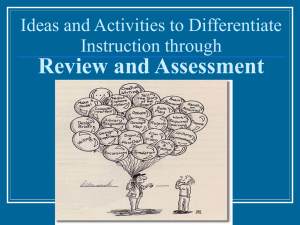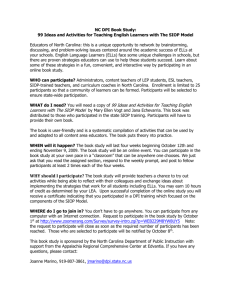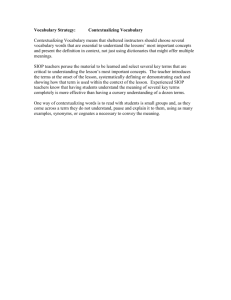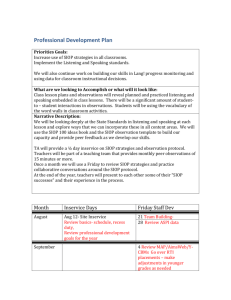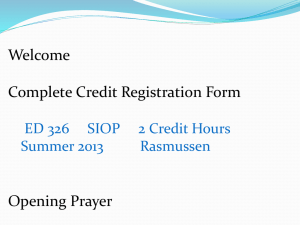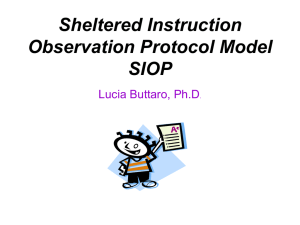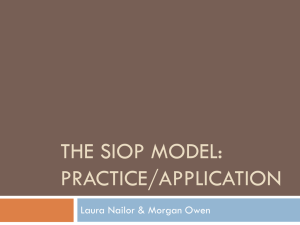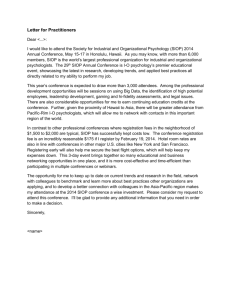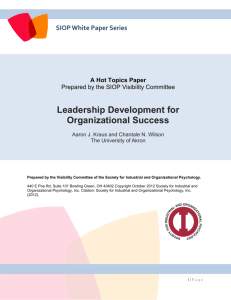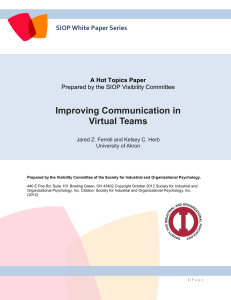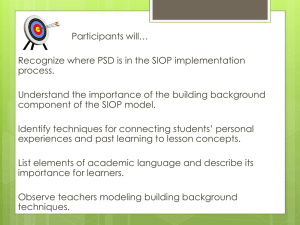SIOP INTERACTION
advertisement
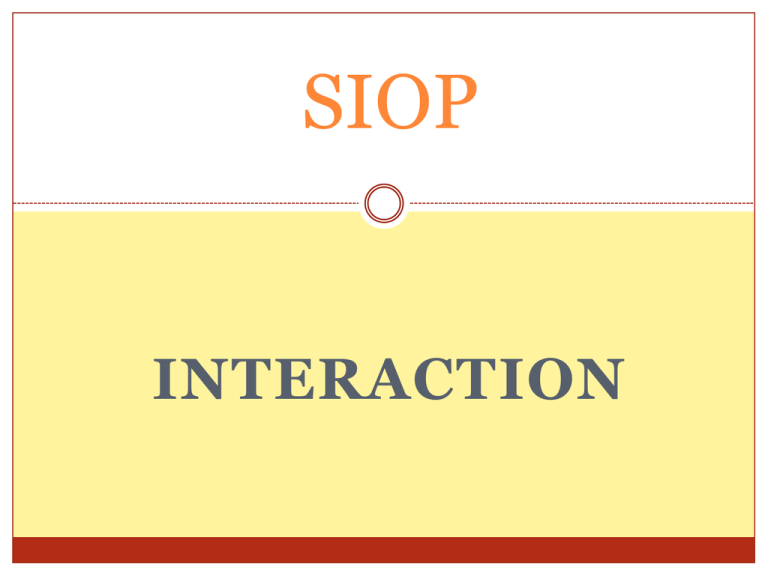
SIOP INTERACTION Review Homework: Mix Freeze Pair 1. 2. 3. 4. 5. 6. Stand up! Walk around the room and greet the other members of our SIOP cadre. Give them a quick and honest compliment. When I give the signal word and motion of “interaction” partner up to the closest person to you. Be prepared to share something you have learned thus far in SIOP classes. The person with the smallest sized shoes on today goes first. Do the signal word of “interaction” and the motion with your partner after you have shared. Today’s Learning Targets: Content Objective: (WHAT) You will be able to understand at least 2 grouping considerations and 2 engagement strategies that you can use to increase interaction in your classroom Language Objective: (HOW) You will be able to share (speak) with a colleague about how you want to implement at least one of today’s strategies What does SIOP say about Interaction? Frequent opportunities for interactions and/or discussion between teacher/student and among students that encourage elaborated responses about lesson concepts Grouping configurations support language and content objectives of the lesson Sufficient wait time for student response Ample opportunities for students to clarify key concepts in L1 as needed with aide, peer, or L1 text Grouping Considerations Students choose Teacher chooses Consider pairing/grouping as a means of scaffolding Consider language proficiency Consider social elements Gender Etc. Try to be intentional when forming groups and reconfigure them often Engagement strategies to create pairs or groups Numbered heads strategy- Kagan engagement strategies Popsicle sticks Pizza partners Use rank ordered lists per academic subject to create leveled groups (highs with mediums & lows with mediums- Kagan book) Use Selector Tools CD Team Timer device Use proficiency levels for ELLs to create groups (ask your building’s ELL teacher for this info.) Take a Stand… SIOP Book Page #116 The teacher needs to have a set of questions prepared ahead of time. This can be done in small groups (or individually). Students will stand if they agree. Students will need to stay seated if they disagree. All students will need to be prepared to share “why” they got that answer and possibly persuade their class mates to side with them. A variation can have the students generate the statements posed to the class. Timed Pair Share Start with the person who watched the least amount TV this week (then go clockwise) For 2 minutes, briefly share with your group an idea about how you may be able to use the “Take a Stand” strategy in your content area Be prepared that you may get more than one turn to share Find Your Match (modified) SIOP Book Page # 112 *Use math or literacy vocabulary cards (need two sets with as many cards per set for half of your class)introduce the cards before starting the activity Take your math card and begin reading the word and definition that is written on your card. When the teacher gives the cue of the signal word and motion, stand up and begin walking around the room looking for your “match” by doing the motion that goes with your card. When you find your match, do a cheer of your choice. Then, reread the word & definition together, finally do the motion one more time. Tell them “you were a great partner!” Give the cards back to the teacher. Jot Thoughts Each person at a table needs a pencil and some small sticky notes Take turns writing, or drawing about how vocabulary cards can be used in (your) classroom. Do one idea per sheet. Think multi-disciplinary and multi-grade level Write or draw until you hear the signal word/motion from the teacher. Read and classify what ideas your group came up with. (Be prepared to share with the group!) Wait time… Remember the 5-2-1 and the 10 & 2? Processing time is important for thinking for all kids Processing time may also be translating time for ELLs. At least 7 seconds of wait time is necessary Variations of think-pair-share Using timing tools Kagan strategies Writing Review Learning Targets… Content Objective: (WHAT) You will be able to understand at least 2 grouping considerations and 2 engagement strategies that you can use to increase interaction in your classroom Language Objective: (HOW) You will be able to share (speak) with a colleague about how you want to implement at least one of today’s strategies Think, Pair, Write, Share Think about today’s language objective, share with your table mates what you think you’ll try in your classroom this week! Feel free to record your thoughts on the purple note sheets.
